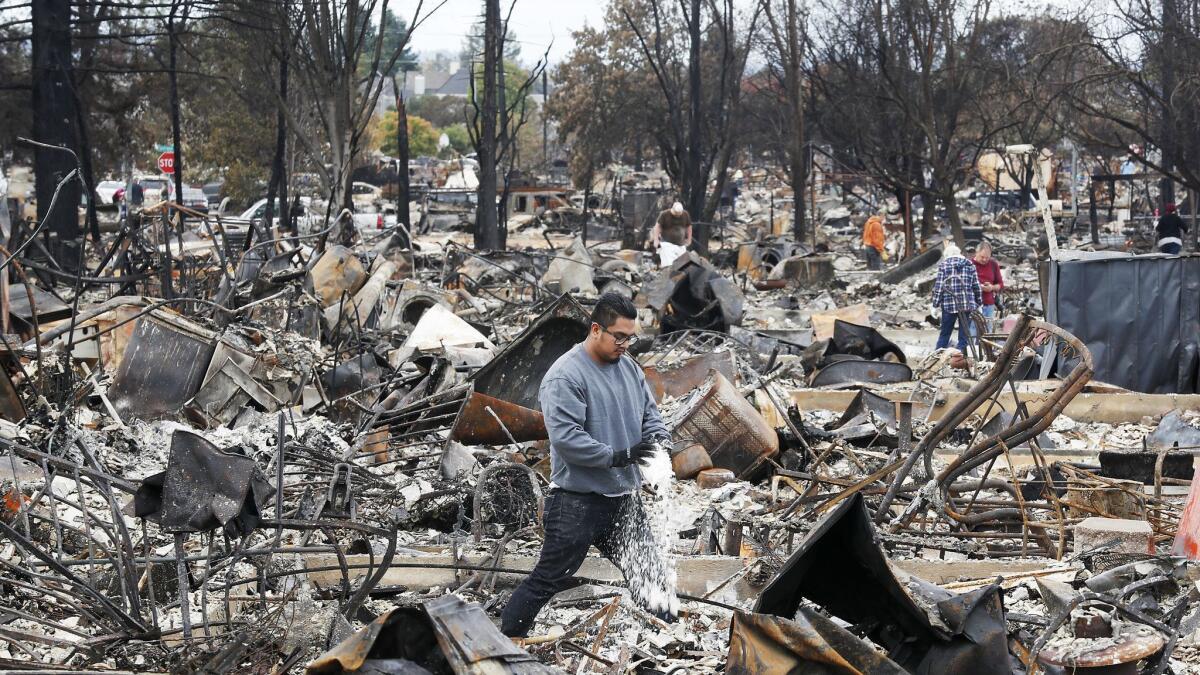Capitol Journal: California voters could — and should — retaliate in November if legislators don’t address wildfire prevention

- Share via
Reporting from Sacramento — When a fire alarm jarred Patrick McCallum from a deep slumber at 4 a.m., he tried to ignore it. He told himself that a stiff wind outside must have set it off.
But McCallum’s wife, Sonoma State University President Judy Sakaki, got up and opened the bedroom door.
“She screamed,” recalls McCallum, a community college lobbyist. “I jumped out of bed and saw flames coming into the house.
“I was in boxer shorts, Judy in a robe. I grabbed my cellphone and we ran for our lives. It was indescribable. Dante’s inferno — 100-foot flames everywhere, trees exploding. The house was completely on fire. We headed uphill. Every place we stepped there were embers. We didn’t have shoes. The smoke got thicker. We were hallucinating and dizzy.”
Two off-duty firemen in a SUV rescued them.
“Without them, I wouldn’t be talking to you now,” McCallum told me the other day. That and the fact he had just changed the smoke alarm batteries a week earlier. If the couple had awakened a few seconds later, they’d probably have perished.
McCallum and Sakaki were among the thousands of wine country fire victims who weren’t warned that a firestorm was headed their way last October. The lack of a good emergency warning system in California is one of the wildfire problems the Legislature is grappling with as it winds up its two-year session.
Cellphone and TV emergency alerts don’t reach many people at 4 a.m. — or anytime, if the fire has killed cell service or electric power.
“How about the old-fashioned way?” McCallum says. “Police officers and firetrucks with bullhorns shouting, ‘Evacuate now.’”
McCallum is lobbying for homeowners and local governments in the current legislative debate.
Sen. Mike McGuire (D-Healdsburg), who represents part of wine country, is sponsoring a bill to require a statewide uniform alert system.
“We’re over-relying on cellphone technology,” McGuire says. “It’s not acceptable that here in California, the land of innovation, we don’t have a universal emergency alert system. I’m tired of the excuse, ‘It costs too much.’ Wildfires are costing lives.”
McGuire’s bill is expected to be included in a package of wildfire legislation that will be sent to Gov. Jerry Brown in the next two weeks.
The Legislature is struggling with how to better prevent and deal with wildfires. It will pass something significant because this isn’t a subject that lawmakers can kiss off as too tough. They can’t procrastinate until next year. Voters would consider that unacceptable and could retaliate in the November election — or at least should.
Another expected piece of the legislative package will greatly increase forest thinning and brush clearance to reduce fire fuel.
But there apparently won’t be an all-out effort to beef up firefighting capabilities.
The Brown administration says the firefighting force is already being gradually strengthened with modern helicopters and air tankers. But it’s not happening as quickly and extensively as one might think is needed given this summer’s record-breaking wildfires that have soiled our skies with unhealthful smoke — especially if it’s the “new normal,” as Brown says.
Coverage of California politics »
The most fiercely fought proposal has been pushed by utilities. They’ve been seeking some slack in financial liability when fires are started by their equipment, such as power lines blown down by wind. In the “new normal” of constant wildfires, they could go broke, the utilities argue.
This has been a classic battle of powerful special interests — mainly utilities versus insurance companies, both heavy campaign contributors. Unions and trial lawyers also are warring — the former on the side of utilities, the latter allied with insurers. Local governments are fighting the utilities.
Brown tried to help the utilities with a compromise proposal, but hardly anyone liked it.
The utilities — including Southern California Edison, San Diego Gas & Electric and Pacific Gas & Electric — apparently have given up on changing the liability law. They’re now asking for much less.
On Tuesday, a legislative conference committee held a three-hour hearing on forest thinning and brush clearance. This is an unusual subject because it’s nonpartisan. Practically no one is against reducing fire fuel.
President Trump, however, has tried to politicize it by claiming that California’s “bad environmental laws” have blocked forest thinning. There might be a smidgen of truth in that for state and private property. But the federal government owns 46% of California and needs to clean up its own forests.
At the legislative hearing, UC Berkeley fire science professor Scott Stephens objected to calling wildfires the “new normal.”
“The idea of ‘new normal’ to me means we’re actually giving up,” Stephens told the lawmakers. He said that California needs to increase its forest thinning by five- to tenfold.
The Brown administration, it seems to me, missed a golden opportunity to make the case for higher state investment in fire prevention and fighting. The Legislature this year allocated $160 million in cap-and-trade money — derived from selling greenhouse gas emission permits — for fire prevention. But Republicans practically begged for a reason to authorize more.
Sen. Anthony Cannella (R-Ceres) repeatedly asked Cal Fire Director Ken Pimlott whether he was satisfied with his budget, and kept receiving non-answers.
“We sure the heck don’t know what the proper funding is,” the lawmaker said.
They definitely don’t have proper funding for a life-saving emergency alert system, and badly need it.
Follow @LATimesSkelton on Twitter
More to Read
Get the L.A. Times Politics newsletter
Deeply reported insights into legislation, politics and policy from Sacramento, Washington and beyond. In your inbox three times per week.
You may occasionally receive promotional content from the Los Angeles Times.











